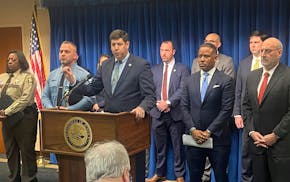The leader of a massive telemarketing scheme that preyed on elderly and vulnerable adults to the tune of $103 million was sentenced Tuesday by a federal judge in Minnesota to 10 years in prison.
The sentencing of Russell "Rusty" Rahm, 54, of Olathe, Kan., the most prominent of the 60 co-conspirators first charged in 2020 in what federal prosecutors called the nation's largest elder fraud conspiracy, also includes two years of supervised release and an order to pay restitution in the full amount to his victims.
The perpetrators lived across the United States and Canada — as did their 183,000 victims who lost about $335 million. All of the 61 defendants have pleaded guilty.
The U.S. Attorney's Office in Minnesota led the prosecution because the investigation grew out of a 2016 Minnesota Attorney General's Office lawsuit against a Fridley man whose magazine subscription company was later ordered by a judge to pay $20 million.
Rahm pleaded guilty to one count of conspiracy to commit mail fraud in 2022. According to his plea, the conspiracy lasted roughly two decades, dating from 2000 until February 2020. He managed two magazine subscription companies in Shawnee, Kan., another suburb of Kansas City.
Rahm admitted that those, and other companies linked to the conspiracy, used fraudulent sales scripts and pitches to dupe victims into paying for expensive, and at times duplicative, subscriptions through a "series of lies or misrepresentations."
Co-conspirators traded "lead lists" of potential victims to contact, and callers were instructed to falsely tell victims they were calling about an existing magazine subscription that was set to auto-renew.
In reality, the companies had no relationship to the victims and were instead defrauding them into buying an unwanted additional magazine subscription package. Prosecutors have said some of the victims were billed by as many as 10 phony companies at once and would incur up to $1,000 in monthly credit card charges.
Rahm helped manage sales leads and billing in exchange for a percentage of the total revenue taken from victims. He also tried to insulate himself from the conspiracy by relying on call centers based in Florida. Rahm said he tried to hide the fraud scheme by setting up virtual offices for his companies.
Assistant U.S. Attorney Harry Jacobs, in the government's memo outlining its case for a 12-year sentence, wrote recently that fixed income elderly victims were swindled out of tens of thousands of dollars of retirement funds. Others, who had dementia, "were repeatedly preyed [on] because of their diminished capacity by Rahm's companies and other companies involved in the conspiracy."
Jacobs wrote: "Rahm was amongst the most culpable defendants involved in this scheme. He spent decades working in the industry and was one of the original players that started committing this type of telemarketing fraud.
"He founded and operated the largest companies involved in the fraud. In many ways, he created the playbook that others involved in the scheme followed. He helped several of the other defendants in this case set up and establish companies that perpetuated the fraud and then made money when those companies defrauded other victims."
Jacobs pointed out that Rahm got rich perpetrating the fraud, unlike many who work in fraudulent industry such as telemarketers. Rahm "lived in a fancy house and drove expensive cars. He had a luxury vacation home on Lake of the Ozarks, where he also partook in powerboat racing. ... He had all the trappings of wealth, all of which was built on proceeds of this fraud scheme."
Rahm now owns a medical device company in the Kansas City area and at one point raced speedboats during his leisure time. But he suffered a massive stroke in 2019 while at a business conference in Las Vegas and was not discovered for about 18 hours. The episode left him with partial paralysis and cognitive impairment, among other lasting health issues.
Because of this, Rahm's attorneys asked Judge John Tunheim to take the unusual step of allowing Rahm to serve his sentence while under home confinement instead of prison.
Jean Paul Bradshaw, a Kansas City attorney representing Rahm, wrote in presentencing court memos that her client needs his anti-seizure medications in a timely manner and is "entirely dependent upon caregivers that would not be available to him in federal prison."
Bradshaw emphasized that "Mr. Rahm regrets his role in this offense and accepts responsibility for it."
Bradshaw acknowledged that home confinement "would not ordinarily be appropriate for an offense of this type and his role in it, but the significant risks posed by typical incarceration would result in a sentence that imposes a penalty far beyond what is necessary in this case."
His defense attorney added that prison could further deteriorate Rahm's health and would pose "the very real possibility that he dies in prison, which would be an excessive and unjust punishment for this offense."
Nicole English, a former U.S. Bureau of Prisons official, provided a declaration in support of home confinement — including the possibility of him becoming a victim of abuse.
"Because of needs that would not be met and his likely assignment to a facility with inmates of all security levels, Mr. Rahm would be prone to extortion or other abuses at the hands of more seasoned inmates," English wrote.
Tunheim rejected the request and sent Rahm to prison.

Five members of Minneapolis Highs street gang found guilty of racketeering conspiracy

Midea recalling 1.7 million of its popular air conditioners due to mold concern

Social media, text chains helped anti-ICE protesters get the word out during Minneapolis raid

TSA agents seize two loaded guns on the same day at MSP Airport
